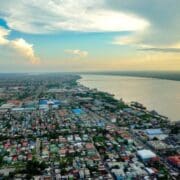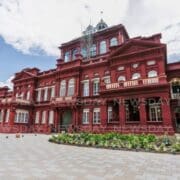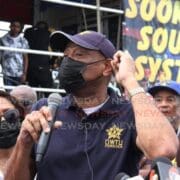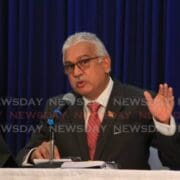Black Immigrant Daily News
By Terrence Blackman, Ph. D. & Utamu Bell
News Americas, NEW YORK, NY, Weds. Aug. 24, 2022: Episode III of the recent ‘Transforming Guyana, The Guyana Business Journal and Caribbean Policy Consortium Webinar Series,’ examined how Guyana can leverage oil and gas revenues to produce a world-class twenty-first-century education system at all levels with a focus on broad coverage of the country and with strong links to the best institutions of higher learning abroad while fostering local skills in key local content areas.
The webinar examined the Global and Regional educational context and imperatives for Guyana, along with the essential role of the University of Guyana in educational transformation. It also highlighted the School of Business Entrepreneurship and Innovation.
The series, ‘Transforming Guyana,’ aims to bring together experts and prominent and diverse voices from Guyana and the Diaspora to discuss the impacts of Guyana’s oil and gas development, take a nuanced look at the opportunities and potential pitfalls ahead for the country, and explore strategies to maximize the positive impacts that oil revenues can have on Guyana’s people and future while mitigating the risks that other countries have faced, as well as identifying the most promising roles the Diaspora can play in this transition.
The Guyana Business Journal framed the webinar by stressing the importance of education as a cornerstone for Guyana’s sustained growth and development. Dr. Blackman alluded to data from the Guyana Labour Force Survey (GLFS) 2021 First Quarter report, which revealed that less than 2.5 percent of the Guyanese labor force possess a Bachelor’s Degree or equivalent and noted that it was self-evident that the quality of Guyana’s human capital and workforce is the cornerstone of Guyana’s ability to advance sustainably, both socially and economically. He said this must be a task which to oil and gas windfall must be applied. “We hope to contextualize the implications of Guyana’s emergence as a Petrostate for its education sector and more broadly the education sector of the Caribbean Region for critical stakeholders and offices,” he said.
Vice Chancellor of the University of Guyana, (UG), Professor Paloma Mohamed- Martin pointed to what she described as the mono-focus that the country is developing on oil revenues only when it has within the last few months found the most significant gold strikes in the world, in addition to other sectors which are likely to contribute significantly. She said these additional revenue streams should also be considered in the conversation regarding education resourcing. Mohamed-Martin said creating a world-class education system is part of the University’s blueprint.
“We should be using our resources to achieve stability, in which education can thrive and take off…We need to consider both rapid but robust upscaling in certain sectors…it has to be a mix between companies or institutions in Guyana and those that are going to come in and help; and those that we will link with. We need to consider and ensure that UG does have the ability to scale up in very critical areas. We think that about 60% of the first investment in tertiary education needs to go to UG, Guyana Technical Institute, vocational schools…School for Agriculture; so that we can scale up very significantly about 30% of the investment offshore and 20% international”, she said.
The Vice-Chancellor noted that critical imperatives of the University include staffing, salaries and conditions, intentional recruitment, and a pipeline plan. “The human infrastructure of a country is what will ensure its sustainability.” Mohamed- Martin said there are currently not enough science teachers in the country, as she pointed to the need for infrastructure improvement at UG and noted that most of them are “60 years old and failing”. She said the science and technology infrastructure was designed for smaller classes. The Vice-Chancellor added that the institution cannot keep up with demands for engineers and is receiving enormous requests for support services. She further pointed to the need for research funding for labs and researchers that can train staff. Mohamed-Martin pointed to the need to look at the entire education system as crucial for investment and the linchpin for sustainable development.
Dr. Cardinal Warde, a Professor of Electrical Engineering at MIT and Executive Director of the Caribbean Science Foundation in Barbados, noted that a robust educational and technological system is needed to develop alternative economic pillars. “We know at present that many of our students who go on to do science and engineering, they come back home, and they can’t find jobs, and that’s sort of a resource that is wasted…they can’t find jobs because they didn’t come back to create them…”, he said.
He outlined the need for attracting and “home-growing” more technology companies and providing infrastructure, though he noted that this is not an easy task in Guyana and the Caribbean. As such, he cited the need for the involvement of the legislative branch to mitigate this issue. In addition, he said that in some cases, many of these students who go abroad never return. “If we can get some of this talent back home and get them involved in entrepreneurship and starting companies, especially technology companies…technology companies that can have a global footprint…to bring in lots of foreign exchange and to be able to make Guyana a First World country…because in the First World, where a lot of them stay they are developing cutting-edge products for large companies that have international and global markets,” Dr. Warde said.
Dr. Warde, who is considered one of the world’s leading experts on materials, devices, and systems for optical information processing, also pointed to the need to reform the educational system- from the Primary to Tertiary levels, as he noted that there is a chance with the revenues from oil and gas. “Oil and gas revenues can be used to reform Guyana’s educational system, especially STEM-based programs. Put much of the GDP into more STEM-based teaching and learning, including training the teachers. It’s a good opportunity to also put better labs in your high schools and your tertiary institutions, that would be revenues well spent if indeed that can be made a priority,” he noted.
He added that government needs to get the people involved and passionate about the new direction of science and technology and where it can take the country. Dr. Warde said training for home-grow companies is essential, as he noted that the UG should be given the relevant resources. According to him, Research labs are also vital. Guyana might be the right place to start a shared one with the rest of the Caribbean, along with a small business innovation research program that funds start-up science and technology companies.
Professor Edward Greene, addressing the imperatives of education for Guyana, said accessible data shows that public spending on education in Guyana as a percentage of GDP is third behind Cuba and Barbados in the Caribbean. The latest global report indicates that Guyana, with an average of 4.45% of expenditure on GDP, compares with an average of 145 countries worldwide. “What is very important is that the Guyana Education Sector Plan 2021-25 is quite impressive in aligning with the sustainable development goals. In addition, it recognizes how the COVID-19 pandemic led to accelerated plans for integrating ICT into the teaching and learning process, which is an important phenomenon,” he said.
Greene said the Plan seems steadfast in ensuring that every student has access to quality education. “One of the most striking paradoxes we must consider as we move ahead is the ‘resource curse, ‘ which Guyana must be mindful of. Countries rich in non-renewable natural resources have experienced slower economic growth than resource-poor countries. As a result, many are far from reaching the ‘education for all goals. After much consideration, it has led me to indicate that our emphasis should be placed on the wider issues of human development, which I think is implicit in what Professor Warde said but more particularly on human capital development,” he said.
He added, “Developing countries like Guyana need to re-orient their education systems to focus on meeting the evolving economic and labor market needs, through both the general or academic education and the technical and vocational track.”
Dr. David Lewis added that the key focus should be on education and human resource development and transformation for Guyana, with the boom currently taking place and what this means for the University as a 21st-century agent of change and development both at the national and regional levels.
Professor Leyland Lucas, SEBI Dean, said one of the things needed to ensure the necessary human capital is to look at innovative ways of attracting the “best and the brightest.”
“We once again find ourselves without the necessary human capital to take advantage of the opportunities that present themselves. So how quickly do we ramp up to ensure the kind of gaps that we’ve experienced in the past so we can correct those errors? For some time now, we have not had a human capital development strategy in place, so we will always have to be playing catch up because of that. But being successful requires that we look at this in terms of what can be done by the nation with the human capital needed- to take advantage of this new economy,” he stated.
Dean Lucas said the pandemic has helped realize innovative things that can attract the best and the brightest, more so virtually, and provide access to a wealth of knowledge. He said looking at the diaspora’s role in education, and business development is essential. He further pointed to issues affecting smooth development, such as access to capital and an archaic banking system, to which he suggested legislative changes.
According to Lucas, UG is an ideal place to develop a much-needed business incubator. Dean Lucas closed by noting that Guyana should aim to have at least one University graduate per household.
EDITOR’S NOTE: Dr. Terrence Richard Blackman, associate professor of mathematics and a founding member of the Undergraduate Program in Mathematics at Medgar Evers College, is a member of the Guyanese diaspora. He is a former Dr. Martin Luther King Jr. Visiting Professor at MIT and a Visitor to The School of Mathematics at The Institute for Advanced Study. Dr. Blackman has previously served as Chair of the Mathematics Department and Dean of the School of Science Health and Technology at Medgar Evers College, where he has worked for almost thirty years. He graduated from Queen’s College, Guyana,Brooklyn College, CUNY, and the City University of New York Graduate School.He is the Founder of the Guyana Business Journal & Magazine.
Utamu Belle is an award-winning Guyanese journalist with a career spanning over a decade. Her experience includes writing for print, television, and online media. She has worked as a Radio and Television host. She is the Founder of A-to-Z Media (Guyana) and a News and Digital Editor with Upscale Magazine.
NewsAmericasNow.com











